Berlusconi wins Italian election
Former prime minister given strong mandate after wins in both houses of parliament.

Final results
Final results from Italy’s interior ministry gave Berlusconi’s 46.8 per cent to Veltroni’s 37.6 per cent in the lower house
“Berlusconi won because he has a strong coalition and because people feel that on the other side, the government is going to take them nowhere,” Franco Pavoncello, a political science professor at Rome’s John Cabot University, said.
The early election was called after the centre-left coalition government of Romano Prodi collapsed in January, having completed 20 months in power.
Economic challenges
The International Monetary Fund forecasts that the Italian economy, the world’s seventh largest, will grow 0.3 percent this year, compared with a 1.4 percent average growth for the 15-country euro area.
James Walston, a political scientist at the American University of Rome, sid that people woould expect Berlusconi “to pull big rabbits out of his hat, but he’s only going to give them small ones”.
Berlusconi said on Monday that his priorities were settling the future of state-controlled airline Alitalia, which the outgoing administration was
struggling to privatise, and clean up a long-standing rubbish crisis in Naples.